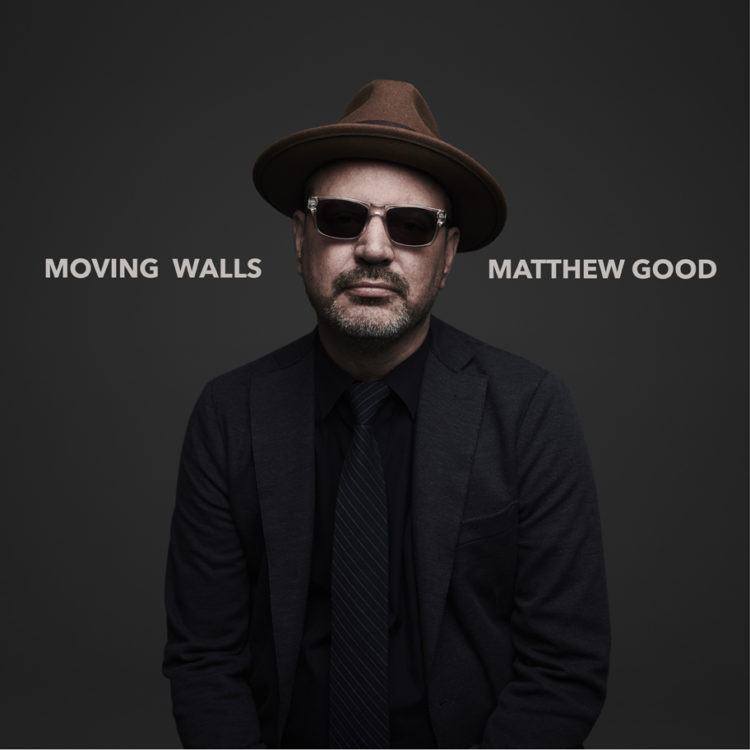
One of the most effusive and honest of Canadian musician/singer/songwriters, Matthew Good has never hesitated to wear his heart on his sleeve, and pull few punches, both in his day to day life. Including interviews with the media, and especially not on record.
The author of a slew of powerfully compelling songs and albums since 1995, as he has aged and become more experienced as a creator, he as also become more boldly honest and revealing of his struggles, insecurities, good times and bad through his music.
Moving Walls, released Feb. 21 through Warner Music Canada, is Good at his deepest, sometimes darkest, but always most real and authentic.
In an age when many artists are considered forgoing the release of a full album in favour of digital only releases of singles or EPs, with perhaps a limited edition run of vinyl, Good has put out a full album of 15 songs – a breadth of material that hearkens back to the seemingly limitless heyday of the CD, when bands routinely produced albums over 60 minutes in length. Actually, according to the Toronto resident and 21-time Juno nominee (with four wins), there was a 16th song on the table for a while.
“We recorded 16, but I didn’t like the 16th song at all. I didn’t like it when I demoed it, but we recorded it anyways. And I remember sitting around with a couple of people from the label in a hotel before we even went into the studio to make the record, I think we were at the rough mix stage, and we went out to dinner and came back to the hotel and listened to the song on Bluetooth speakers and I was like, ‘man, I just do not feel that track. I don’t f***ing feel that track at all. And one of the label guys said, ‘yeah, I can see that one totally going,’” Good said.
“We were all in agreement with losing the song, including management. The only one who wasn’t was [long-time collaborator and pal] Warren [Livesay]. I thought the song was just too typical ‘me.’ It was like this fast, short two-and-a-half minute song, and not particularly interesting for me. It just didn’t fit the record.”
Moving Walls takes the listener on a musical and emotional journey and could quite possibly be Good’s most sedate, yet emotionally intense offering over his quarter-century career, first under the banner The Matthew Good Band, before recording and releasing material as simply Matt Good since 2003.

“I got divorced, and at the same time, my dad’s dementia got to be really bad. He also got lung cancer, which has since moved into his bones. So, I am at home, and I am helping my mom take care of my dad. The winter before, I had nowhere to write because I was back living with my parents, so I basically set up a table and bought a new computer and I demoed the whole album in my parents’ garage. So, doing all this writing and demoing, I am literally 10 feet away from garbage and recycling cans,” said Good of the ‘environment’ in which he created this truly exceptional, revelatory and evocative collection of songs.
“So, it was a really weird process because it started at about six or seven o’clock at night and, of course I write everything in the song, from the strings to the drums to everything else. I actually start writing the song, like say Sicily, I started writing that one at about seven or eight one night and I was done at 3 a.m. and sent it off to the powers that be. And I did that with almost every song on the record, where I did it in one night.”
But the process worked, as the songs on Moving Walls, from the catchy lead-off single Sicily to the moving and emotive Selling You My Heart, to the lush Boobytrapped, are self-contained nuggets of what was going on Good’s head and heart during the writing process in all of its varied splendour. As well, the skill at which Good is able to capture the instrumentation, vocals, rhythms, and even some effects on his demos made for an incredibly streamlined final recording process when he ensconced himself at The Bathouse Studio near Kingston with long-time collaborator, engineer/producer Livesay.
“The whole process was so natural for me, and I can’t really explain why or how I was so productive. I guess I just had a lot to say, but that’s what art is in every way, shape and form. It’s the filter through which whatever is happening in your life goes through. So, at that particular moment, yeah, there are songs on the album if you really think about what I am saying you can equate them to certain things that were going on,” he said.
“And I think that speaks to how quickly some of the songs were written. It was like, okay, boom, there it is. I didn’t even need a lot of time to think about it, it was just there. It was an odd thing, a very odd thing. For example, if you listen to the beginning of Fingernails, a lot of people will automatically assume that there’s some kind of sound effect of rain or whatever. No, that’s actually rain hitting my parents’ garage door, and it’s just from the microphone I have being compressed super wide open while I was playing acoustic guitar three feet away. There are a lot of things that a very natural and very serendipitous.
“Like at the beginning of Dreading It, how that acoustic guitar randomly strums, that’s my daughter, because she just happened to be there at the time. I guess it was before her bedtime or something. And she was just holding my guitar and I said, ‘Elizabeth, strum daddy’s guitar.’ And I just recorded it, and I threw it over top the beginning of the song because that’s the one I happened to be working on at the time. And when I demo, it’s not like the old days where you just sit around and write songs on a guitar. These days I have a computer, I have a keyboard, I have guitars, I can play the drums right there. So, I demo the song in its entirety, and its basically just a rougher version of what will be polished later on with real instruments. There many be a few different sounds and stuff, but its usually just a sound thing, usually just an engineering thing when you’re actually in the studio.”
Good said there was no real difference in the vibe of working at the Bathouse, owned by The Tragically Hip, since the passing of lead singer Gord Downie, because it’s always been a special place.
“I have worked there a bunch of times and pretty much half the guys that work for me, worked for The Hip. So, I am not going to say it affected me to any great extent, but obviously there were a couple of conversations that came up about Gord, mostly remembrances or whatever. But, for the most part you’re locked into what you’re doing and it’s central to your day, you’re there to make a record,” he said.
“I think maybe for younger people it might have been a more ominous experience, but having been around for 25 years, it’s different. I had spent enough time with the guy when he was alive and had a lot of great conversations with him that it’s not something I ever thought of – him as this ‘legend.’ He was my friend and he was a fantastic artist. He was a hell of a guy.”
Good had planned an extensive tour in support of Moving Walls, but due to the COVID 19 crisis gripping the world, he, like pretty much every other artist, has cancelled or postponed shows for the foreseeable future.
For more information on any rescheduled dates, or the album itself, visit www.MathewGood.org, or www.facebook.com/matthewgoodmusic.
- Jim Barber is a veteran award-winning journalist and author based in Napanee, ON, who has been writing about music and musicians for 30 years. Besides his journalistic endeavours, he now works as a communications and marketing specialist. Contact him at jimbarberwritingservices@gmail.com.
https://www.youtube.com/watch?v=CQgCm2E_CYA&feature=youtu.be
https://www.youtube.com/watch?v=ff7twhRk5I0
SHARE THIS POST:
